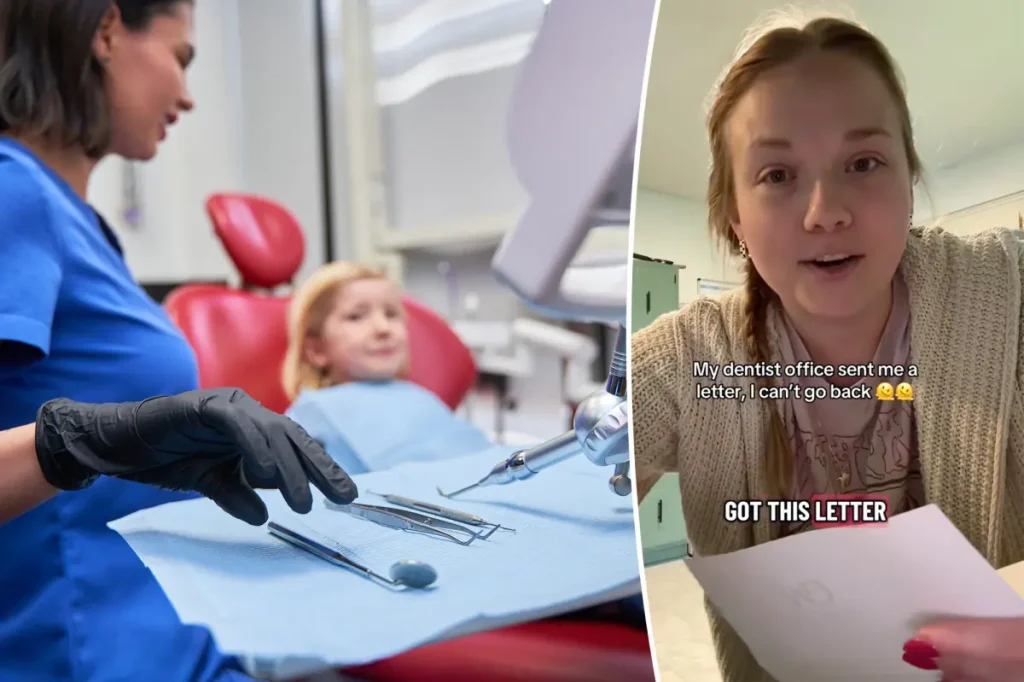Parenting in Public: When Kid Chaos Leads to Consequences
In today’s fast-paced world, parents face countless challenges, but few situations are more stressful than managing children’s behavior in public spaces. This reality hit home for 32-year-old Taylor Nitti, a Minnesota mother of four young children aged 7, 5, 4, and 3, who recently experienced a parenting low point that many can relate to. Like countless busy parents, Nitti routinely brings her children to her appointments, juggling the practical logistics of parenthood with everyday responsibilities. However, during what should have been a routine dental cleaning, her children’s typical sibling squabbles and excess energy created enough disruption that she received an unexpected consequence: a formal letter from her dentist’s office requesting she no longer bring her children to appointments. This incident highlights the delicate balance parents must maintain between understanding normal childhood behavior and respecting public spaces – a challenge that left Nitti feeling defeated and questioning her parenting abilities.
The situation unfolded like many parents’ nightmare scenarios – Nitti’s children began bickering in the waiting room, their behavior escalating even after she went in for her actual dental appointment. The subsequent letter she received, while politely worded according to Nitti herself, delivered a clear message that her children’s presence was no longer welcome at the practice. “I was already down on my parenting and who I am as a mom and then I got this letter… I literally wanted to cry,” she shared in a TikTok video documenting her experience – ironically with her children audibly playing rambunctiously in the background. The video quickly generated responses, with many commenters siding with the dental office. “The background noise justifying the letter,” noted one viewer, while another commented, “Girl you shouldn’t have to be told this. They aren’t babysitters. You should have felt guilty for the noise and disruption at the time, not when you get a nice letter.” These reactions reveal the complex social expectations placed on both children’s behavior and parents’ management of that behavior in shared spaces.
This incident touches on a universal parenting challenge: finding appropriate childcare solutions during necessary appointments. For many parents, especially those with multiple young children, bringing kids along is not a preference but a necessity due to financial constraints, scheduling difficulties, or lack of support systems. The dental office’s perspective is equally valid – professional settings require certain standards of calm to function effectively, especially in healthcare where concentration may be critical. Disruptions can impact other patients’ experiences and staff’s ability to work efficiently. The tension between these realities creates a difficult situation where both sides have legitimate concerns, yet solutions aren’t always readily available or affordable for parents already stretched thin by the demands of raising children.
What makes Nitti’s experience particularly poignant is how it reflects the emotional weight parents carry when their children misbehave publicly. Her tearful reaction to the letter reveals the vulnerability many parents feel when their children’s behavior is criticized, especially when they’re already doing their best in challenging circumstances. Parenting today often happens under intense scrutiny, with standards that can seem impossibly high. Social media has amplified this pressure, creating environments where parents feel constantly judged. The fact that Nitti shared her experience online – and received substantial criticism in return – demonstrates how parenting has become a public performance subject to widespread evaluation, adding another layer of stress to an already demanding role. The video’s irony – featuring her children making exactly the type of noise that likely prompted the letter – wasn’t lost on viewers, but it also humanized the reality of what managing young children actually sounds like.
Nitti’s situation reflects a broader societal question about how we accommodate families in public spaces. While children need to learn appropriate behavior, they learn through experience, making “child-free” policies a challenging solution. Some businesses and service providers have responded by creating family-friendly environments with designated play areas or family appointment times, recognizing that accommodating children benefits their business model. Others maintain stricter policies prioritizing quiet professional environments. This divide creates a checkerboard of spaces where families either feel welcome or excluded, further complicating parents’ navigation of daily life with children. The comment section on Nitti’s video illustrates this division, with some viewers expressing empathy for her situation while others firmly supported professional boundaries, suggesting a lack of consensus about children’s place in public spaces.
The story takes an even more serious turn when considered alongside emerging legal trends. Nitti’s experience involved only the inconvenience of finding a new dentist, but some communities are implementing more severe consequences for parents whose children create public disturbances. The article mentions that parents in Gloucester Township, New Jersey now face potential legal penalties – including up to 90 days in jail – for their children’s public misbehavior under a law passed in July. This represents a dramatic escalation from social disapproval to legal punishment, raising serious questions about how society balances holding parents accountable with providing realistic support for families. As community standards evolve around children’s behavior, parents like Nitti find themselves navigating not just dirty looks or uncomfortable conversations, but potentially serious repercussions for the unpredictable behavior of developing minds. This growing trend suggests our collective struggle to find balanced approaches to supporting families while maintaining functional public spaces – a challenge that affects everyone whether they’re raising children or not.














